To My Former Professor Who Is Still Teaching Me Important Life Lessons
Sister Julia, teacher, historian, writer and custodian of the dead, advocates for those the world ignores or has forgotten
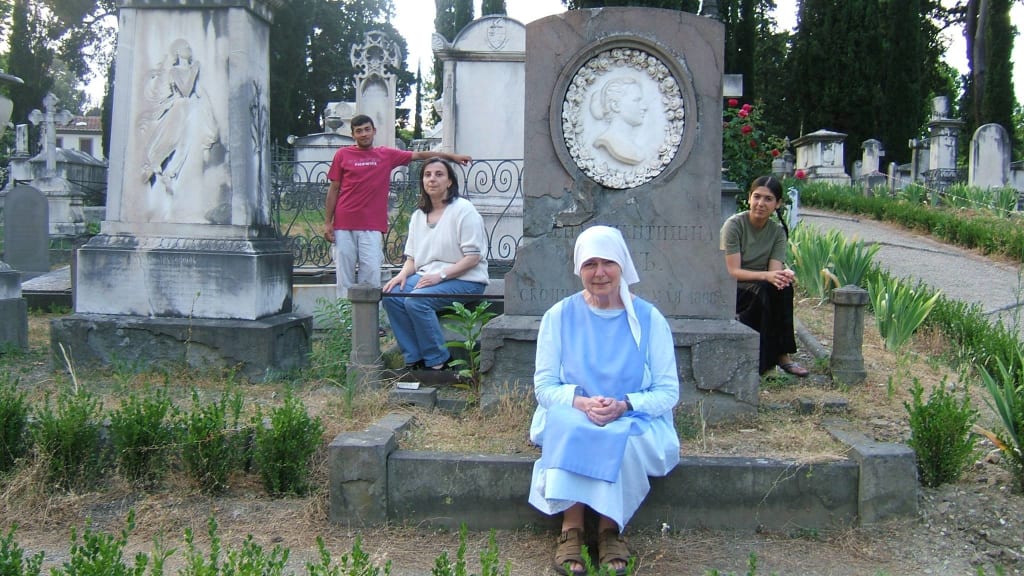
Dear Sister Julia,
Thank you for being such an encouragement and inspiration, not only as a teacher but also as a friend and mentor.
You were the first person to tell me that I should publish my writing and you treated all of my essays as if they were written by a fellow scholar. I hear your voice encouraging me every time I sit down to write.
A long time ago, I knew you as Professor Holloway, when you taught Introduction to Medieval Studies at The University of Colorado. I took the class on a whim, to balance out all my science courses, and completely fell in love with medieval literature and history. I even wound up minoring in Medieval Studies because your teaching was such a revelation.
I came to adore Chaucer’s Canterbury Tales and Dante’s Divine Comedy. I caught your passion for these two writers and I still love their books today. If I’m feeling lost and unsure, I dive into Dante’s Commedia and find comfort in his journey with the Roman poet Virgi by his side, walking from the lowest depths to the highest heights, from despair and uncertainty to hope and comfort.
“In the middle of the journey of our life I found myself within a dark woods where the straight way was lost.” ― Dante Alighieri, The Divine Comedy
Forgotten Women
Thank you for introducing me to the women mystics and visionaries of medieval Europe. I learned about Christine de Pizan, a noblewoman, poet and the first professional female author, Julian of Norwich, an influential writer on the medieval religious experience, Catherine of Siena, an Italian saint, Margery Kemp, a female mystic and traveler, and Hildegard von Bingen, a 12th century Abbess, composer, writer and advisor to popes and kings. I still listen to Hildegard’s beautiful, haunting chants and choral music when I write.
You can listen to a sample of Vision - The Music of Hildegard Von Bingen.
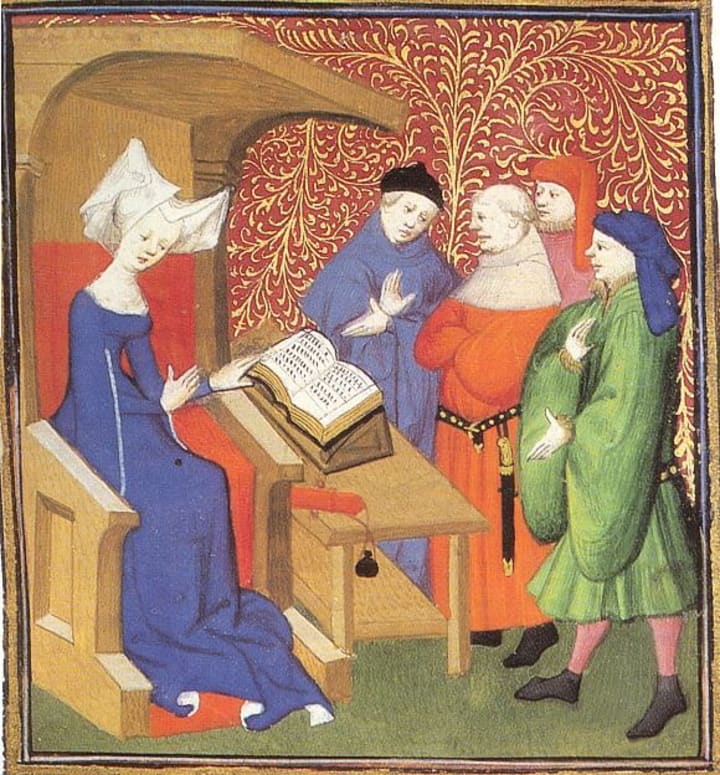
I was fascinated by these amazing women. They had such strong characters and left such a mark in their time and yet the modern world has largely forgotten them. They were moving and compelling storytellers and orators. Thank you for teaching me about these inspiring women and keeping their stories alive. I'm certain they were influential in my becoming a writer.
And speaking of strong women. When we gathered for informal dinners, you told me your stories of raising three children while studying for your doctorate and how hard that had been for you. You faced family resistance to your studies, and you struggled financially, but you persisted.
When you started your degree, you discovered that grad students in your department routinely sabotaged each other’s work to improve their own chances of getting a degree, but you were determined your group would be different. You gathered your fellow students together and encouraged them to join forces, to work together, so all of you would graduate. They listened and collaborated. Every single student in your year got their PhD. This didn't happen before, or again, at that school.
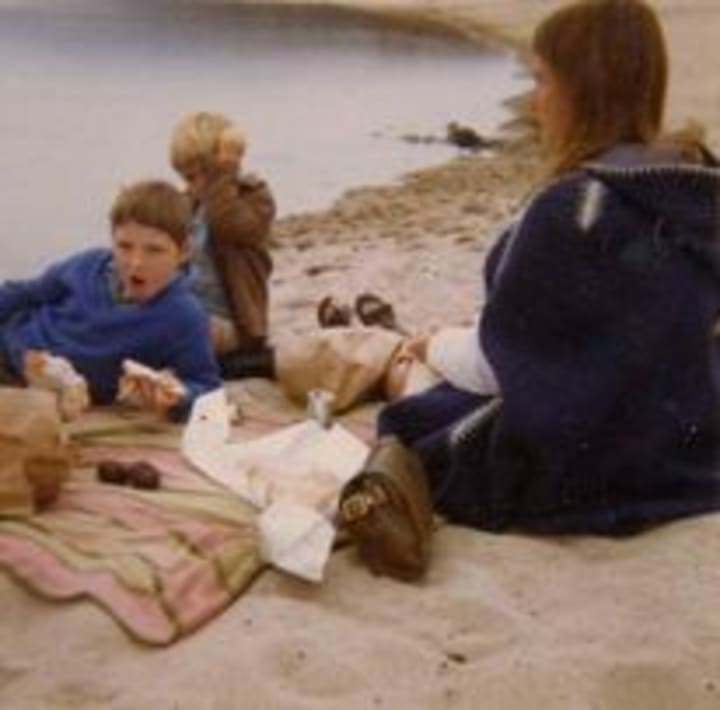
You have a quiet yet firm ability to persuade people to act reasonably and with consideration. You treat everyone with dignity and expect them to rise to their better natures. I know you’ve been disappointed in people, but you never let that stop you from believing that people will always behave better next time. People respond to your good will and often do lift their game.
You were such an inspiring teacher in college, and I’m so glad we stayed in touch over the years.
What you didn't talk about when you were teaching, and I only found out years later, was how you also grappled with unpleasant university politics and a difficult personality in your department who made your life stressful. You were always professional and didn't let on to your students about the drama behind the scenes.
When you wrote to tell me that you’d become a nun, and retired from academia, this new direction in your life made perfect sense. Becoming a nun allowed medieval women to devote themselves to learning and writing without the obligations of raising a family or running a business. With your sons grown, you could now focus on your studies and your writing without needing to deal with backbiting colleagues or departmental politics.
The Forgotten Cemetery
When I heard that you’d taken a position as Custodian of the English Cemetery in Florence that seemed like another perfect role for you. You love history and the past. As a teacher, you make the lives and words of long-dead people vivid and compelling.

The English Cemetery was where foreigners who died in Florence in the 19th century were put to rest. The poet Elizabeth Barrett-Browning is buried here, along with others who were part of a celebrated Victorian expatriate literary community, known as the Golden Ring. This cypress-crowned hill on the edge of the old city is packed with authors, poets, artists, abolitionists and intellectuals who were well-known in their day, but have fallen into obscurity.
People such as Walter Savage Landor, writer, poet and activist, Arthur Hugh Clough, poet and assistant to Florence Nightingale, Isa Blagden, novelist, speaker and poet, Richard Hildreth, an American historian, abolitionist and author, and Theodore Parker, Unitarian minister, reformer and abolitionist, whose writing inspired the speeches of Abraham Lincoln and Martin Luther King, Jr.
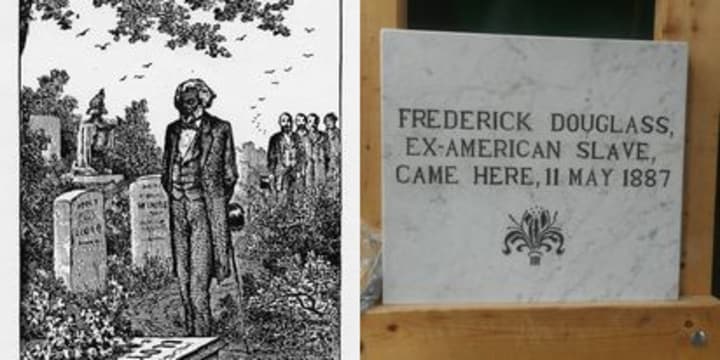
In 1887, Frederick Douglass, the African American social reformer, abolitionist, author, speaker and statesman, visited the English Cemetery to pay his respects to abolitionists and anti-slavery writers buried here.
Closed in 1887, the English Cemetery had fallen into ruins and by the time you agreed to be the caretaker, the site had been shut to the public for decades. The President of the Swiss Evangelical Reformed Church (which owns the land) picked you as the person who would rise to the challenge of restoring the site. After meeting you, he saw the same combination of passion, quiet achievement, persuasion, kindness and dignity that I see.
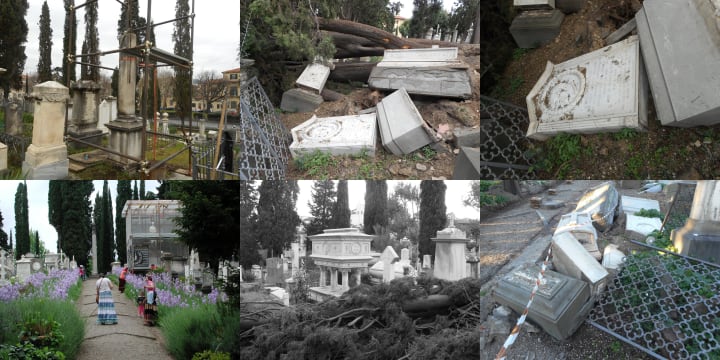
In true Julia fashion, your only condition for taking the position was to be able to build a library. You used the library to continue teaching and researching. The book-lined rooms became a place you would teach Roma to read and write. Where medieval scholars would travel from all over the world to consult with you and reference the collection you’d put together.
“A mighty flame follows a tiny spark.” ― Dante Alighieri, The Divine Comedy
Where I would come to visit and learn about the history of Florence and the Medici, about the Brownings and the Golden Ring, with its poets, authors and social reformers.
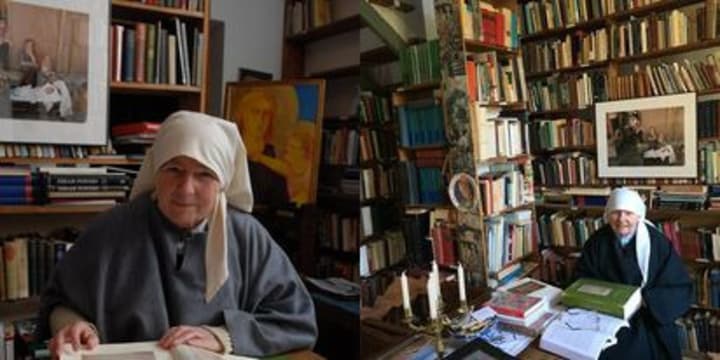
At the end of my visit, you gave me what’s likely to be the best assignment ever. You handed me a wonderful idea for a novel about the Golden Ring, still the professor matching the assignment with the student's particular interest and talents, even all these years later. You laid out a plot for me and sparked my interest. You had too many other books to write, and too much research to do, you told me. And besides, you don't write fiction but you felt I would do your idea justice. That's high praise coming from you.
The Forgotten Dead
The Cemetery has been a project of love for you. With help from your Roma workers, you planted thousands of iris bulbs – the official flower of Florence – and narcissus, so in the spring, the entire hill becomes a sea of purple, lavender and white blooms.
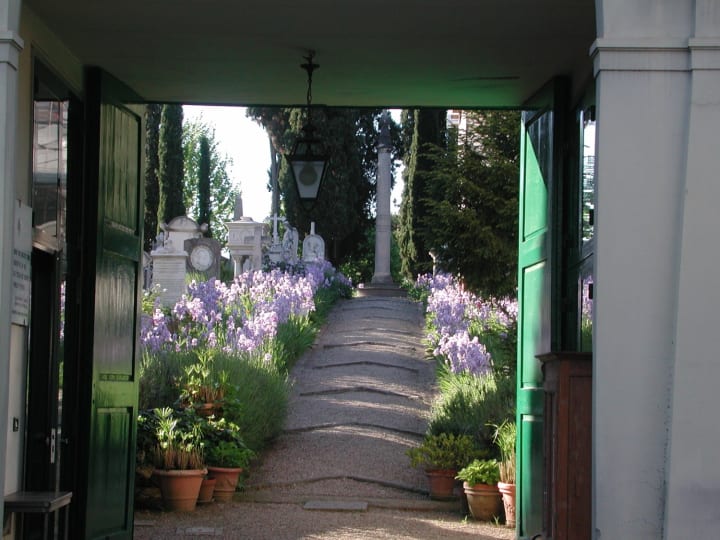
You identified all the people buried in the Cemetery, made a map of the graves, and created a website where people can research the tombs. You reached out to the descendents of people buried here and encouraged them to support restoring the graves and to come and visit their ancestors, giving them a connection to their own past.
People want to be buried in the English Cemetery again – even Italians! – although now it can only be ash burials. Your devotion and hard work has enabled a six-figure annual income for the Swiss Reformed Church through new burial fees. (The President chose well.) I met an Italian nobleman who prefers to one day lie in the English Cemetery rather than in his family’s marble vault because he said he could feel the love and would be surrounded by flowers.
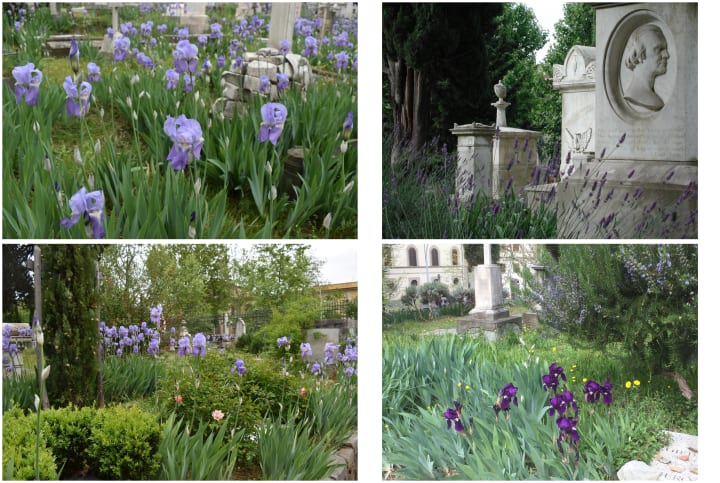
A Persecuted People and Their Forgotten Holocaust
Julia, because you treat everyone with dignity and kindness, when you encountered a Roma woman on the street who’d just given birth and was evicted during a snowstorm, your first thought was to ask the woman and her husband to come and live with you. You were simply living your faith. You welcomed Roma into the cemetery, into your life and into your heart.
You didn’t even hesitate. You turned a deaf ear when people said Roma couldn’t be trusted, that they’d cheat you or steal from you. You reminded people that you’re a nun and took a vow of poverty so you don’t have anything to steal anyway. Did I mention that you have a wry sense of humor?
“Love rules me. It determines what I ask.” ― Dante Alighieri, The Divine Comedy
The Roma are a formerly nomadic people, originally from India, who have migrated or settled throughout Europe. They call themselves Romani, or Roma, but many people call them Gypsies. Anti-Roma sentiment and discrimination is widespread. While anti-Semitic sentiment would not be tolerated in most of Europe, anti-Roma sentiment flourishes and Roma are often persecuted and harassed. In Italy, Roma men usually work as day laborers and the women beg. Roma have few options for earning money, as they have low levels of education, yet are reviled for begging and working menial jobs. Many Roma in Italy come from Romania, where there is little work, and they have large extended families to support.
(This TRT World video "Italy's Problem with the Roma" explains many of the issues that Italy's Roma face.)
The Nazis branded Roma as “sub-human” and killed roughly half a million of them during World War Two. It’s called the “Forgotten Holocaust” as most people today aren’t even aware of the atrocities committed against the Roma. Many were experimented on by Nazi doctors. Even today, Roma collectively resist COVID-19 vaccination as it brings back the trauma of Nazi medical experiments.
In gratitude for your kindness, Julia, the homeless couple you took in scrubbed the house clean of decades of neglect and rebuilt a collapsed stone wall. You realized then that you’d found willing, hard workers to help you restore the English Cemetery and you could provide income for a disadvantaged people. (Ironically, you hadn't been able to find any young Italians who were willing to do the hard labor that the Roma do.)
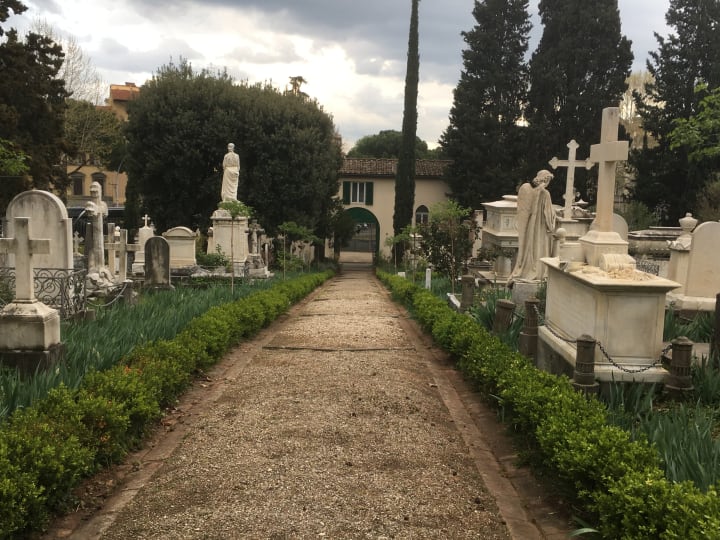
So you hired Roma to help you restore the Cemetery. You sent Daniel to apprentice with one of the last master stone carvers and restorers, Alberto Casciani, in Florence. Casciani couldn't find any young Italians who wanted to learn his art and he feared his skills would die with him. He welcomed his new student. Daniel learned how to restore period sculpture and marble using contemporary techniques, and began to restore the many graves in the cemetery.
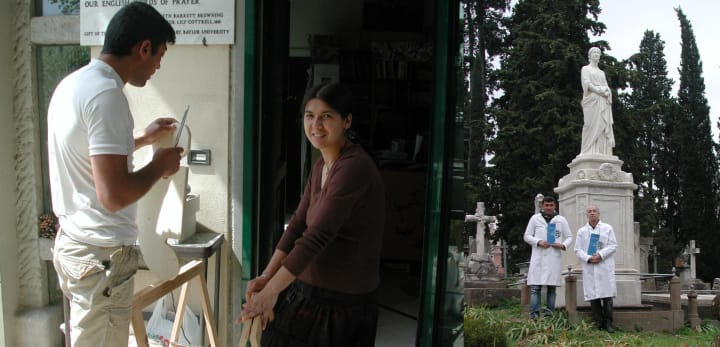
You hired Diamante as your housekeeper and cook, and her husband Ionelle as a gardener, another homeless couple you found living on the streets. Their children had been taken by Italian Social Services after the family was brought from Romania into Italy by a human trafficker.
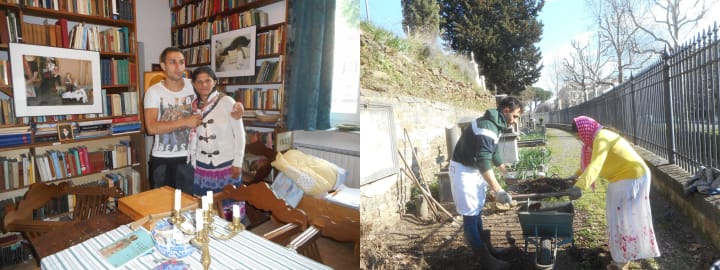
You set up handicraft programs, teaching Roma to make marbled paper and bind books, and persuading them to use their centuries-old woodcarving skills to make and paint cradles for sale, the aptly named "From Graves to Cradles" project.
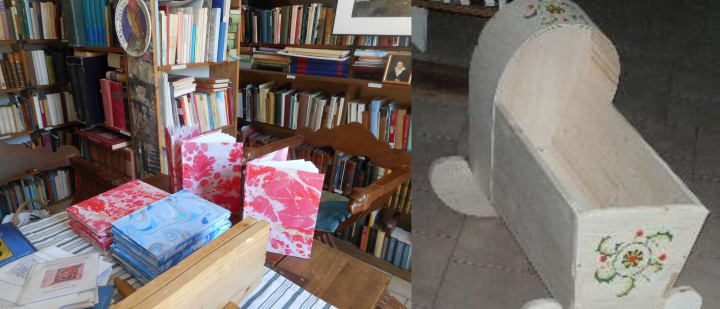
The Alphabet School
Julia, you have this amazing ability to find and direct resources, and to match people with what they need. I’ve benefitted from this so much as your student. At university, you always knew exactly the right text to assign me to spark my interest.
When you realized that many of the Roma, especially the women, are barely literate, you set up a school in the library to teach them. Roma men and women who aren’t in the same family can’t sit together so you had one class in the library for the women and children, and a second outside in the portico for the men. This must have required great patience which is another trait that I admire in you.
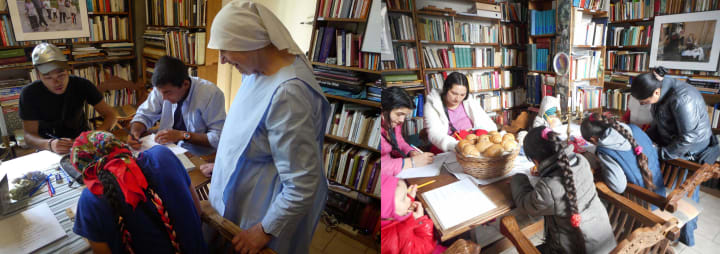
You discovered the Roma were keen to learn and you were so proud of their efforts when they could start to read Italian and write their letters. The Roma will often sign a confession because they can’t read and wind up being charged with crimes they didn’t commit or pay ludicrous fines. You knew if Roma could read and write Italian, they’d have a better chance of being able to stand up for themselves.
Righting Wrongs
You persuaded a human rights lawyer to argue (pro bono) Diamante and Ionelle’s case all the way to the International Criminal Court in the Hague, where they won. Because of you, Italian Social Services was ordered to return the children. Because of the case, the Romanian government filed a formal complaint against Italy for violating the human rights of its citizens.
I admire the way you get fired up about injustice. When you see how the Roma are treated, with such endemic prejudice, or when a mother is forced to be apart from her children, that's the rare time I see your eyes flash and your voice gets strident. Even when you’re angry at people for their cruel, thoughtless behavior and speech towards the Roma, you still treat these offenders with dignity. You speak to them calmly and admonish them gently for not being kinder.
I really admire how non-judgemental you are. Hate the sin, not the sinner, you always say. You were even forgiving of the trafficker that was instrumental in taking Ionelle and Diamante's children.

You are always working hard to change people's attitudes to the Roma and I admire the way you introduce the workers in the English Cemetery to visitors as equals, which is not a way that many Italians are used to viewing the Roma.
Teaching Me To Open My Heart
I am so thankful for the lessons you gave me in opening my heart to the Roma. When I first arrived, I was hesitant and fearful around them, thinking of the stereotypes I'd heard in Italy -- i.e., the Roma are thieves, they don't want to work, they're lazy, they have poor hygiene -- and worrying that my phone or laptop might be stolen. But you showed me who Daniel, Diamante, Ionelle and Nicholae are as people.
The Roma in Italy are often homeless or live in primitive settlements of shacks. Nicholae, for instance, lives under a bridge. He sends most of the money he earns back to Romania, to his family, and supports 12 people. He often showed up for work hungry as he was saving to pay for an operation for his son.
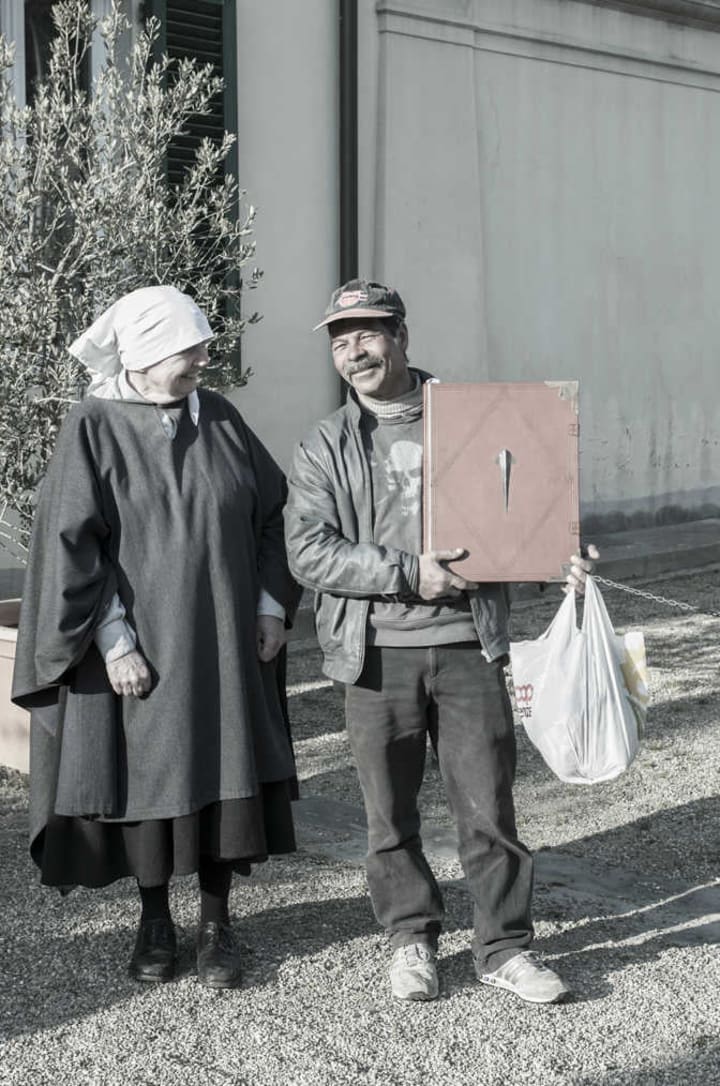
While it's true that a small number of Roma are thieves or pickpockets, they're all branded as such. I came to understand the desperation that some of them feel. If my daughter needed an operation or was hungry, and I couldn't afford medical care or food, would I steal to pay for these things? I honestly can't say that I wouldn't. By having a good income, I live a life where I don't have to face such choices.
Despite this, not once in two weeks were any of my things touched or moved without someone asking me first. Diamante was even reluctant to clear my piles of books from the kitchen table to prepare for a meal.
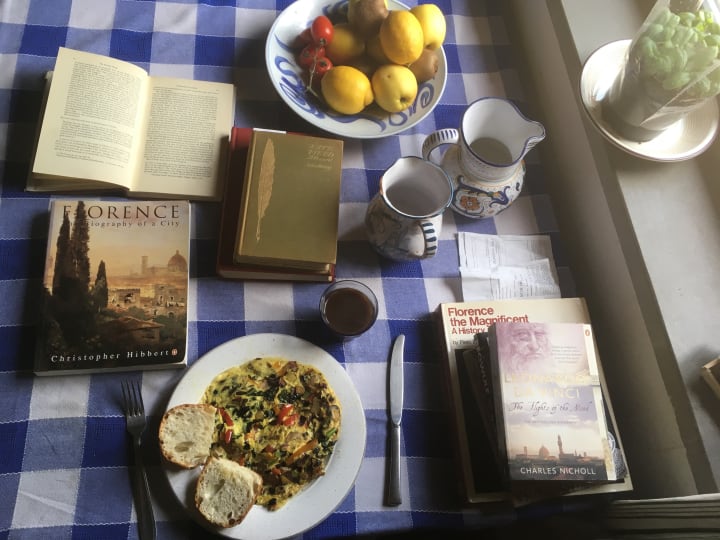
I was surprised to discover that so much of what I had believed about Roma isn’t true. For example, they’re scrupulously clean – bathing twice a day – and wash their clothes daily, even when they’re living on the streets. If I stood close to any of the Roma, even the women begging near Dante's house, all I smelled was soap.
The Roma are excellent cooks, even the men. I was treated to delicious, hearty Roma cooking the whole time I stayed there. Daniel insisted on making me his roast chicken casserole (it was soooo good). Of course, I couldn't watch him make it, or take a photo, because since we're not related, we couldn't be alone together in the kitchen. Oh well.
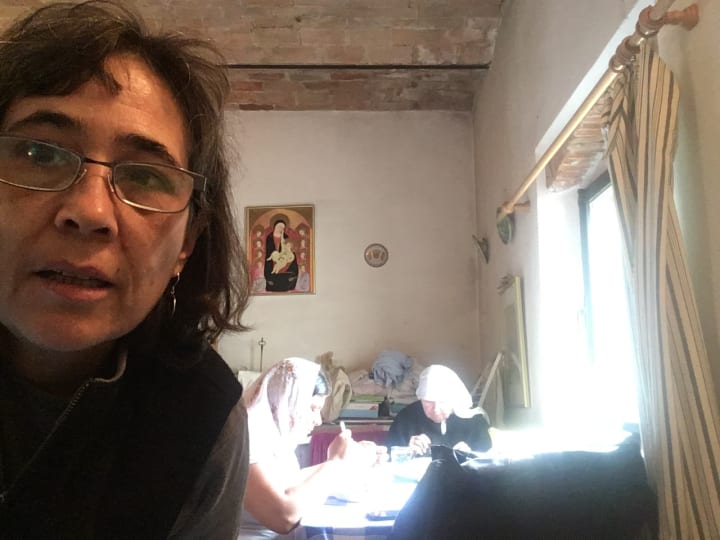
Once you befriend the Roma, they are fiercely loyal. When I listened to their stories, talked with them, got to know them, and went to church with them, Ionelle and Diamante began to treat me as a friend, to tease me and laugh at jokes with me and tell me about their lives. Julia, I love how they both call you Mama, because they really have become son and daughter to you.
Julia, I admire your determination to make helping the Roma in Florence your latest avocation. They have so few heroes watching over them. You are truly a champion of the forgotten and invisible.

Thank you for all the lessons, in and out of the classroom. Thank you for introducing me to Chaucer, Dante, Hildegard, Diamante and Ionelle. Thank you for teaching me to open my heart to the Roma.
Thank you for being such a strong woman and for always inspiring, encouraging and mentoring me. It’s such a joy to know you and have you in my life.
I am so grateful for your love, support, mentoring and friendship.
***
If you want to support Sister Julia’s work with the Roma and the Alphabet School, please buy her a cup of coffee or check out the English Cemetery website.
Dante’s Divine Comedy (Commedia) quotes from Good Reads
All photos by the author or used by permission from Sister Julia

About the Creator
Liz Sinclair
Amateur historian who loves travel and lives in Asia. I write 'what-if' historical stories, speculative fiction, travel essays and haiku.
Twitter: @LizinBali. LinkedIn: sinclairliz


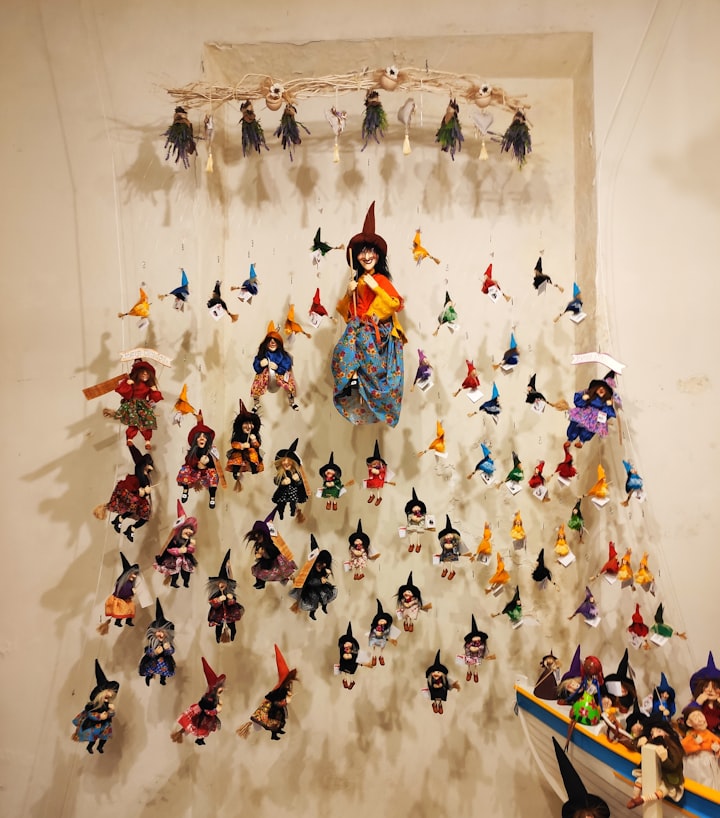



Comments
There are no comments for this story
Be the first to respond and start the conversation.